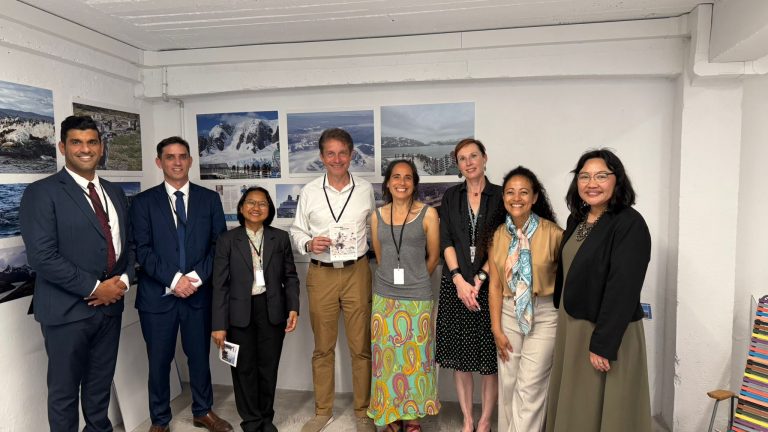
The Lancaster University led in-person side-event titled ‘Ocean justice: Championing fair and inclusive blue economy’ took place on Monday, 9 June 2025. This solution-focused event explored how different delegates understand ocean justice and the obstacles to achieve inclusive blue economy. The event provided an avenue for delegates to share their innovation and best practices that could serve as viable routes to ocean justice.
The event was chaired by Dr Senia Febrica, Research Associate, Lancaster University. It spoke directly to the goal of “Voluntary Ocean Commitments” by mobilizing and engaging all relevant stakeholders including governments, different UN bodies, and civil society from the Global North and the Global South that are vital for transforming into sustainable and inclusive ocean-based economies and achieving Goal 14 and its targets.
Dr Celine Germond-Duret, Lecturer in Environmental Politics and Policy, Lancaster University noted that ‘ocean-dependent communities should be treated as active partners, rather than participants in the blue economy processes’, stressing the importance of mutual learning and meaningful participation of communities in decision-making processes. She called for the recognition of different types of ocean justice(s) to reflect local specificities and challenges.
Ms Alison Clausen, Deputy Global Coordinator of the UN Decade of Ocean Science for Sustainable Development, Intergovernmental Oceanographic Commission (IOC) of UNESCO further explained that ‘ensuring meaningful participation of communities in blue economy include providing capacity building to enable communities to participate in negotiation and management of community-led initiatives.’
Dr Francois Bailet, Senior Legal Officer, United Nations Division for Ocean Affairs and the Law of The Sea (UNDOALOS), pointed out the urgency to find new financial innovation and creative ways for inclusive blue economy where human and nature can thrive, for example through ‘blended finance’, ‘public-private partnership’, ‘blue bond’.
Mr Yoshioka Tatsuya, Founder of Peace Boat and Emilie McGlone, Director of Peace Boat US stressed that we can only achieve fair and inclusive blue economy by strengthening the capacity of young people to access marine science and to actively participate in blue economy and ocean-climate-biodiversity governance.
Drawing from the best practices and experience of the Government of Fiji, Mr. Andrew Coriakula, Ocean Specialist, Head of Unit-Ocean, Ministry of Environment and Climate Change, the Government of Fiji highlighted the importance of explicit recognition of customary law, tenure systems and traditional knowledge in constitution and legislation to protect the human rights of ocean-dependent communities in the context of blue economy development.
Ms. Maria Catalina Garcia Chaves, University of Amsterdam, Erigaie NGO, Colombia; Mr Gonzalo Rodríguez Prado, National Directorate for Aquatic Resources, Ministry of Livestock, Agriculture and Fisheries, Uruguay; and Dr. Anas Alamoush, World Maritime University urged ocean stakeholders to address the negative consequences of blue economy development towards Indigenous People, small-scale fishers, women and girls, young people and children around the world and advance ‘justice’ approach in blue economy that take into accounts the rights of human and more than human world.
‘Less talk and more action to protect the ocean. We need to increase investment and funding for a healthy ocean. Ocean is 99% of planet living space where biodiversity thrives, yet Sustainable Development Goal (SDG) 14 is the least funded SDG. A healthy ocean will contribute to our health and longevity of ocean economies.’ With these words Fabien Cousteau, third generation of aquanaut, founder and chief oceanic explorer of Proteus Ocean Group concluded the event.
During discussions, delegates emphasised the critical need to:
- Look at blue economy from justice lens as we need to speak to those ‘unseen’ and ‘unrepresented’ in blue economy processes.
- Advance ‘multispecies justice’ approach to blue economy that take into accounts the rights of human, especially ocean-dependent communities such as Indigenous People, women and small-scale fishers and more than human world such as microbes, marine fauna & their habitats. Increase investment and funding for a healthy ocean and communities who depend on it.
- Explore new financial innovation and creative ways for inclusive blue economy where human and nature can thrive, for example through ‘blended finance’, ‘public-private partnership’, ‘blue bond’.
- Urgently address the negative consequences of blue economy development towards Indigenous People, small-scale fishers, women and girls, young people and children around the world who are facing challenges posed by ocean grabbing, militarization and exclusion due to expansion of blue economy activities.
- Strengthen the capacity of young people to access marine science, including social sciences, and to actively participate in blue economy and ocean-climate-biodiversity governance.
- Embark on innovative solutions to support just energy transition, sustainable shipping and coastal community resilience leaving no one behind.
- Emphasize co-design and co-development of solutions in blue economy planning, implementation, and monitoring processes.
- Ensure meaningful participation of communities in blue economy beyond providing them a seat on the decision-making table. This implies the need to provide capacity building to enable communities to participate in negotiation and management of community-led initiatives.
- Advance the principle of ‘mutual learning’ and ‘partnership’ that highlight the needs, interests and active role of communities in the blue economy processes.
- Ensure that blue economy initiatives are fully integrated into national and regional ocean governance frameworks, and that these are inclusive and remain adaptive to new and relevant knowledge.
Lancaster University co-organised the event in close partnership with the Ministry of Environment and Climate Change, the Government of Fiji; Peace Boat United States; United Nations Development Programme Archipelagic and Island States Forum Secretariat (UNDP AIS); Intergovernmental Oceanographic Commission (IOC) of UNESCO; and Segara Nusa Nawasena.
